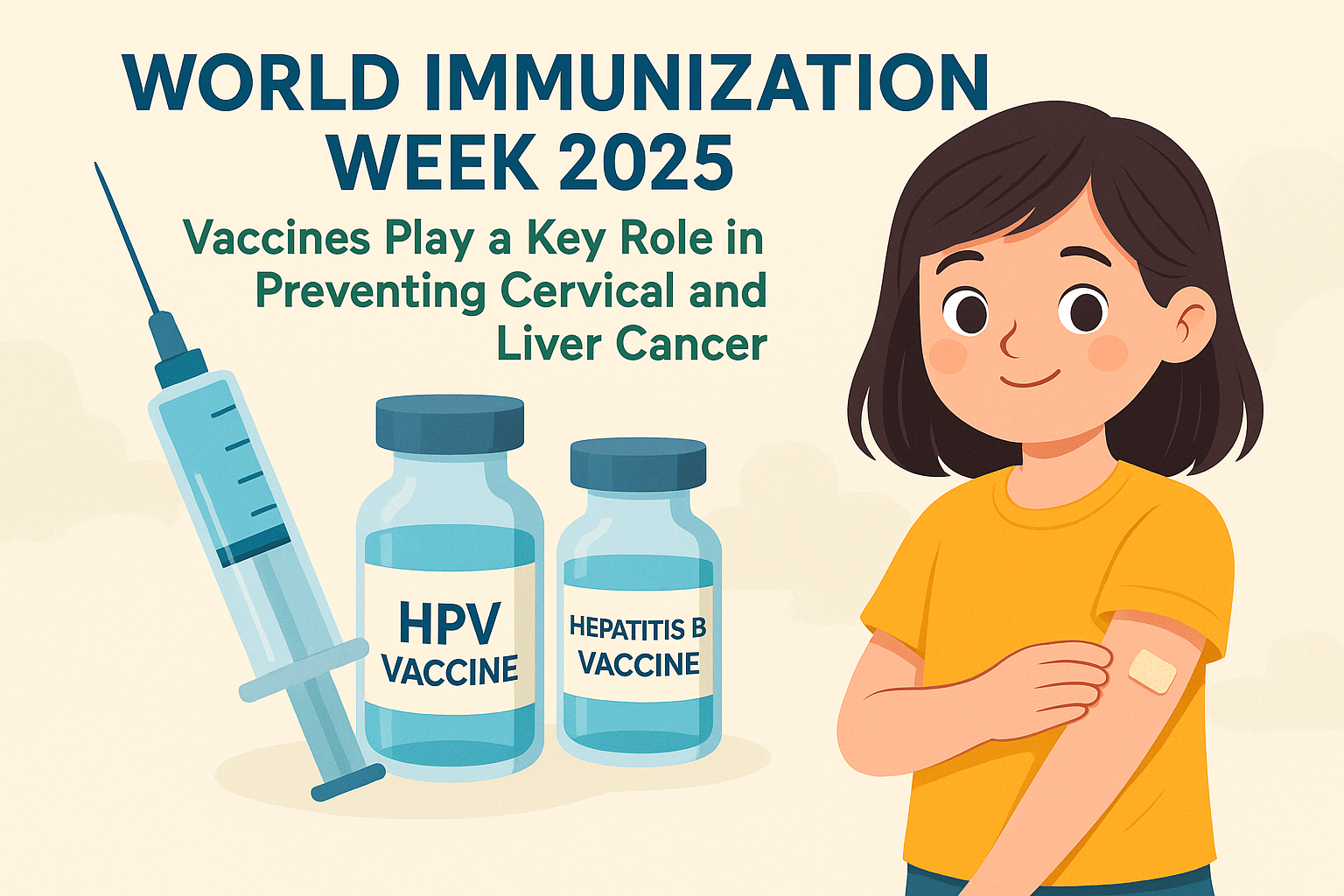Each year, World Immunization Week serves as a reminder of one of humanity’s greatest achievements: the power of vaccines to prevent disease, save lives, and protect future generations. While we often associate immunization with childhood illnesses like measles or polio, vaccines also play a crucial role in cancer prevention — a fact not everyone realizes.
This World Immunization Week, let’s reflect on the amazing progress made in global health and explore how immunization contributes to cancer prevention.
A Brief History: The Miracles of Immunization
Immunization has a long and inspiring history:
-
1796: Edward Jenner developed the first successful vaccine against smallpox, laying the foundation for modern immunology.
-
20th century: Widespread vaccination campaigns drastically reduced illnesses like polio, measles, diphtheria, and whooping cough.
-
1980: The World Health Organization (WHO) declared smallpox eradicated — a disease that once killed millions annually.
-
Recent decades: Vaccines have expanded to prevent not only infectious diseases but also cancers associated with infections.
Today, vaccines prevent 3.5–5 million deaths each year, according to the WHO. Their impact on global health is nothing short of extraordinary.

Photo from tripurastarnews
WHO’s Message for World Immunization Week 2025
As the WHO celebrates World Immunization Week 2025, the theme “Immunization for All is Humanly Possible” highlights the monumental progress made in vaccination efforts. Over the last 50 years, vaccines have saved at least 154 million lives — an astounding 6 lives per minute, every day, for five decades. This achievement accounts for 40% of the improvement in infant survival, and measles vaccination alone has saved 60% of those lives.
However, the future of immunization holds even more promise. There’s a continued need to reach populations who have never been vaccinated, protect older adults from diseases like influenza, and safeguard infants from diseases like malaria and RSV. As WHO states, we stand at a watershed moment in global health, and continued collaboration is necessary to ensure that the gains made — such as the eradication of smallpox and near-eradication of polio — are not lost.
This year’s World Immunization Week aims to ensure that even more children, adolescents, and adults are protected against vaccine-preventable diseases, with the ultimate goal of achieving immunization for all.
Vaccinations That Prevent Cancer
Certain cancers are linked to infections caused by viruses and bacteria. By targeting these infections early, vaccines can reduce — and even eliminate — the risk of developing specific cancers. Here are key examples:
1. Human Papillomavirus (HPV) Vaccine
-
Cancers prevented: Cervical, anal, vaginal, vulvar, penile, and oropharyngeal (throat) cancers.
-
About HPV: It’s a common virus; most sexually active people will get it at some point. While many infections clear up naturally, persistent HPV can cause cancer.
-
Vaccine impact: HPV vaccines (like Gardasil and Cervarix) have proven incredibly effective, especially when given before exposure (typically during adolescence). In countries with high vaccination rates, early data already shows a dramatic reduction in cervical cancer rates.
2. Hepatitis B Vaccine
-
Cancers prevented: Liver cancer (hepatocellular carcinoma).
-
About Hepatitis B: It’s a virus that can cause chronic liver infection, leading to cirrhosis and cancer.
-
Vaccine impact: Universal newborn vaccination programs have significantly reduced rates of chronic hepatitis B infection and liver cancer worldwide, particularly in regions like Asia and sub-Saharan Africa.
3. Helicobacter pylori (H. pylori)
-
Potential future vaccines:
-
H. pylori, a bacterium linked to stomach cancer, doesn’t yet have a widely available vaccine. However, research is ongoing, and preventive strategies (like eradication therapy) are already helping to lower stomach cancer risks.
-
Why Immunization Matters in Cancer Prevention
Cancer prevention often focuses on lifestyle changes — avoiding tobacco, eating healthy, exercising. But vaccines add another crucial layer of protection by blocking cancer-causing infections before they can cause harm.
Yet challenges remain:
-
Vaccine coverage is uneven, especially in low- and middle-income countries.
-
Misinformation and vaccine hesitancy can derail progress.
-
Adults often miss opportunities for catch-up vaccinations that could still lower their cancer risk.
Expanding access to vaccines — and educating people about their benefits — can save millions of lives not just from infections, but from cancers decades later.
Looking Ahead
The history of immunization shows that collective action leads to monumental victories for humanity. By embracing vaccines that prevent cancer, we have the chance to add another remarkable chapter to this story.
As World Immunization Week 2025 approaches, let’s celebrate the incredible achievements vaccines have made possible — and renew our commitment to a healthier, cancer-free future.
Vaccines don’t just save lives — they save futures. Make sure you and your loved ones are protected. Talk to your doctor about cancer-preventing vaccines today.
For more insights on cancer prevention, research, and inspiring stories from around the world, follow OncoDaily — where experts and advocates come together to share knowledge and hope.
By: Md Foorquan Hashmi, MD, Sr. Editor, OncoDaily: India Bureau
